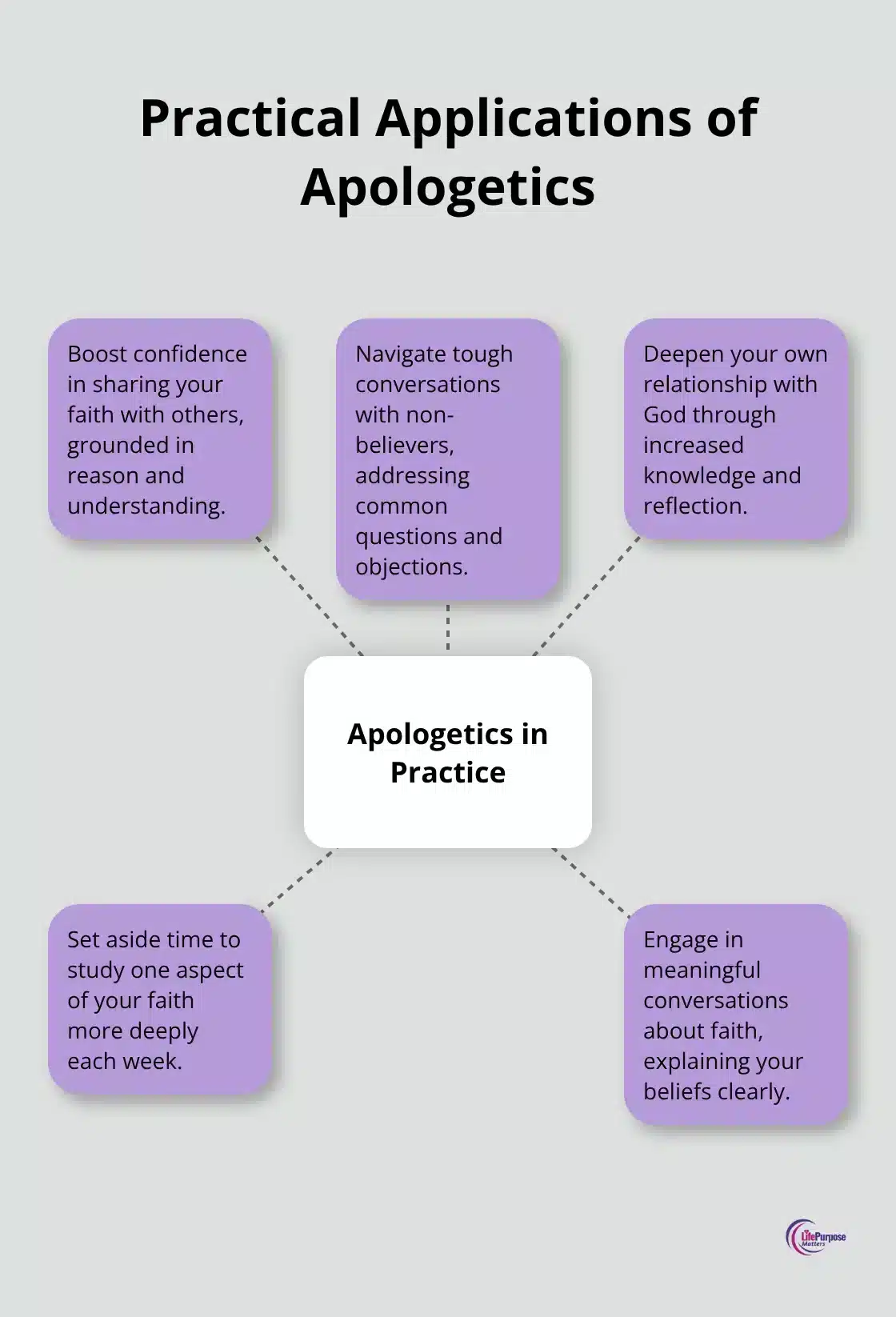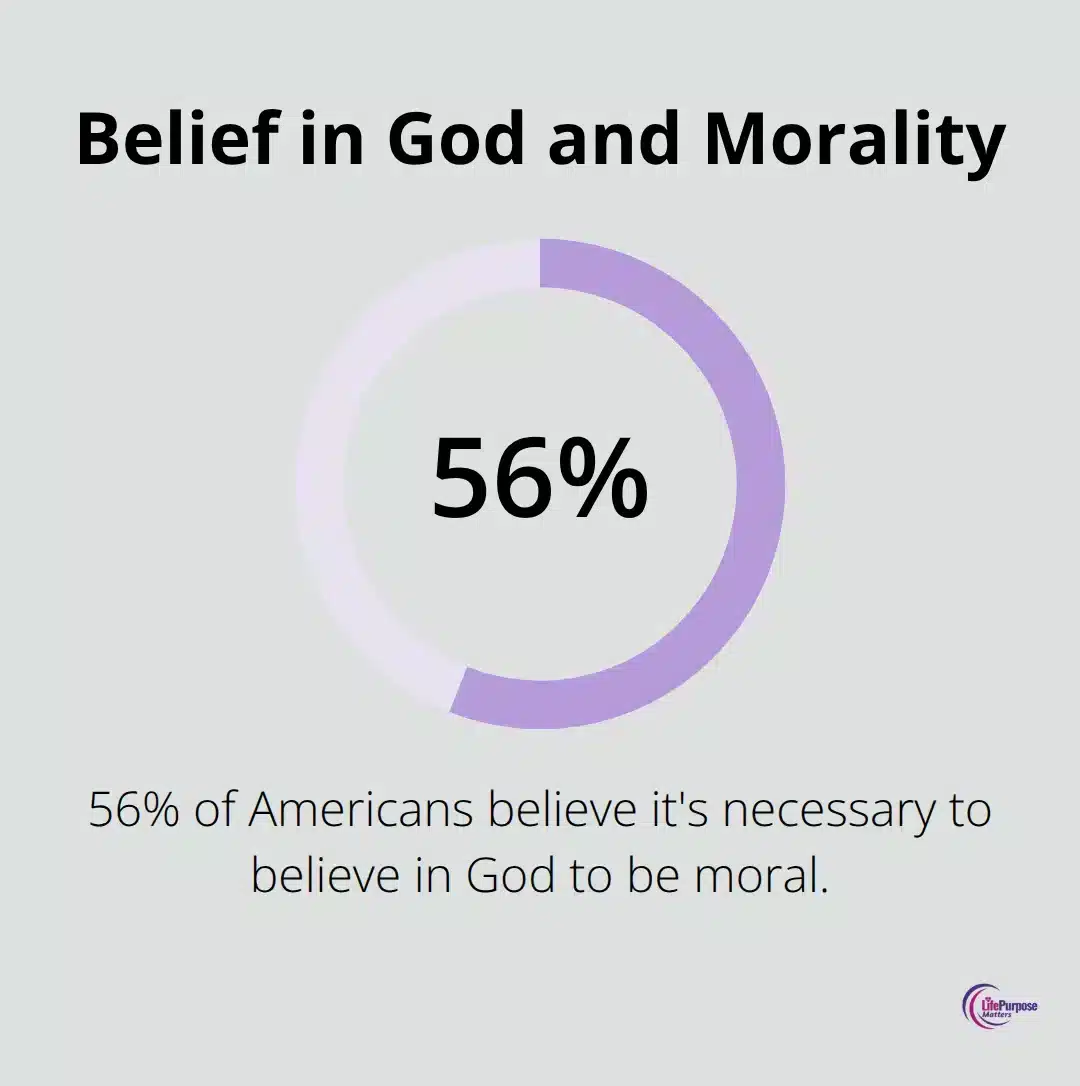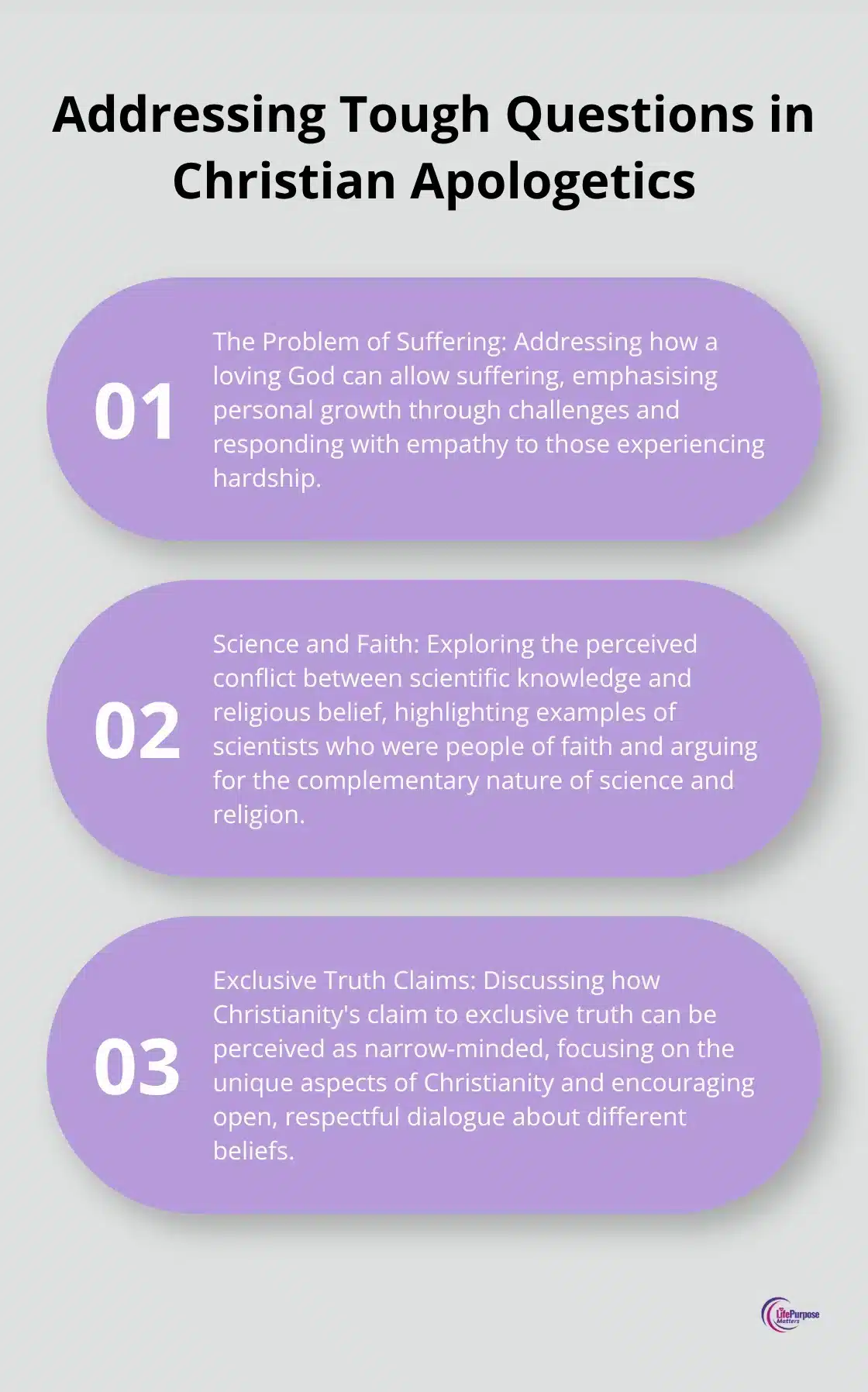Ever felt challenged about your faith and wished you had better answers? At Life Purpose Matters, we understand that feeling all too well. Christian apologetics equips believers to defend their faith with reason and evidence. This guide will introduce you to the basics of apologetics, helping you navigate common questions and objections about Christianity.
Table of Contents
ToggleWhat Is Christian Apologetics?
The Essence of Apologetics
Christian apologetics is giving a reason or defence for the Christian faith. It’s not about winning arguments, but about sharing the truth of Christianity in a way that makes sense to others (and maybe even to yourself on those days when doubt creeps in).
The Biblical Foundation
You might be surprised to learn that apologetics isn’t a modern invention. It’s actually rooted in Scripture. 1 Peter 3:15 strongly advocates the use of Christian apologetics, encouraging believers to “always be prepared to give an answer to everyone who asks you to give the reason for the hope that you have”. This verse often serves as the cornerstone of Christian apologetics.
The Importance in Today’s World
In our increasingly secular society, a solid grasp of apologetics is more important than ever. It’s not just about defending your faith against sceptics – it’s about strengthening your own beliefs and articulating them clearly.
Think about it: how many times has a challenging question about your faith caught you off guard? Maybe a coworker asked how you can believe in a good God when there’s so much suffering in the world. Or perhaps a friend wondered how you can trust the Bible when it’s so old. These are the kinds of questions that apologetics helps us address.
Practical Applications
Understanding apologetics can impact daily life in numerous ways. It can boost your confidence in sharing your faith, help you navigate tough conversations with non-believers, and even deepen your own relationship with God.
One practical way to start incorporating apologetics into your life is to set aside time each week to study one aspect of your faith more deeply. This could involve reading a book on the historical evidence for Jesus’ resurrection or listening to a podcast about the moral argument for God’s existence.
The goal of apologetics isn’t to have all the answers, but to engage in meaningful conversations about faith. It’s about explaining why you believe what you believe, in a way that’s both intellectually satisfying and personally compelling.

Moving Forward
As we prepare to explore specific apologetic arguments in the next section, keep in mind that this knowledge isn’t just for your head – it’s for your heart, and for sharing with others who seek truth. Let’s embark on this journey to deepen our understanding and strengthen our ability to articulate our faith.
Key Arguments in Christian Apologetics
Christian apologetics provides a foundation for understanding and sharing our faith. These key arguments strengthen our beliefs and equip us for meaningful conversations about Christianity.
The Universe Had a Beginning
The cosmological argument proposes that the cosmos is here and had to come from somewhere. It could not have created itself, as nothing comes from nothing in nature. This cause, we argue, is God. Astrophysicist Hugh Ross’s study revealed that the universe expands at a precise rate allowing life to exist. This fine-tuning suggests an intelligent designer rather than random chance.
William Lane Craig’s “The Kalam Cosmological Argument” offers a detailed examination of this concept and its implications for our understanding of God’s existence. (This book serves as an excellent resource for those who want to explore this topic further.)
Morality Needs a Foundation
The moral argument states that objective moral values exist, and these values require a moral lawgiver-God. A 2019 Pew Research Centre survey found that 56% of Americans believe it’s necessary to believe in God to be moral. This statistic highlights the widespread intuition that morality and belief in God connect.

To apply this in your daily life, observe instances of universal moral truths. For example, the idea that it’s wrong to torture innocent people for fun is universally accepted across cultures. This universality points to an objective moral standard beyond human invention.
Jesus’ Resurrection: More Than a Story
The historical evidence for Jesus’ resurrection compels many to believe. Dr. Gary Habermas, a leading scholar on the resurrection, identified minimal facts on the Resurrection of Jesus Christ that even sceptics accept.
Lee Strobel’s “The Case for Christ” presents a journalist’s investigation into the historical evidence for Jesus, including interviews with 13 leading experts. (This book provides an excellent starting point for those interested in the historical basis of Christianity.)
Practical Applications of Apologetics
These arguments aren’t just theoretical-they have real-world implications for how we live and share our faith. Understanding them allows us to approach conversations about faith with confidence and clarity, grounded in both reason and revelation.
Try to incorporate these arguments into your daily life. For example, when you observe the beauty and complexity of nature, reflect on the cosmological argument. When you encounter moral dilemmas, consider the foundations of your ethical decisions.
As we move forward, we’ll address common objections to Christianity. These challenges often arise in conversations about faith, and understanding them will further equip you to engage in meaningful discussions.
Tackling Tough Questions About Faith
The Problem of Suffering
When it comes to faith, we all face challenging questions. The problem of evil and suffering is perhaps the most emotionally charged objection to Christianity. It’s not just an intellectual puzzle; it’s a deeply personal issue that affects us all.
Dr. Peter Kreeft, a philosophy professor at Boston College, suggests that suffering can serve a greater purpose. He points out that often, our greatest personal growth comes through overcoming challenges. This doesn’t make suffering easy, but it can help us see it in a new light.
When faced with this question, respond with empathy. Share your own experiences with suffering and how your faith has helped you through them. The goal isn’t to win an argument, but to offer comfort and understanding.
Science and Faith: A False Dichotomy?
Many people believe that science and faith are incompatible. However, this view often stems from misunderstandings about both.
Dr. Francis Collins, who served as director of the National Institutes of Health from August 2009 to December 2021, argues that science and faith are complementary. In his book “The Language of God,” he shares how scientific discoveries strengthened his faith.
When discussing this topic, focus on the many scientists throughout history who were people of faith. For instance, Georges Lemaître, a Belgian cosmologist and Catholic priest, first proposed the Big Bang theory in scientific form in 1931. These examples show that scientific inquiry and religious belief can coexist (and even thrive together).
Exclusive Truth Claims
In our diverse world, Christianity’s claim to exclusive truth can seem narrow-minded. However, this objection often misunderstands the nature of truth itself.
Ravi Zacharias, a renowned Christian apologist, pointed out that all religions make exclusive truth claims. The question isn’t whether a belief is exclusive, but whether it’s true.
When addressing this, focus on the unique aspects of Christianity, such as the historical evidence for Jesus’ resurrection. Encourage open dialogue and respectful exploration of different beliefs. Try to share why you find Christianity compelling, not to dismiss other faiths outright.
Practical Application
Engaging with these tough questions isn’t about having all the answers. It’s about willingness to wrestle with difficult issues and share your faith journey honestly. Your personal experiences and growth in faith are powerful testimonies in themselves.
As you explore apologetics, consider joining a study group or attending workshops (such as those offered by Life Purpose Matters) to deepen your understanding and practice articulating your beliefs. These settings provide safe spaces to discuss challenging topics and learn from others’ perspectives.

Final Thoughts
Christian apologetics equips believers to articulate their faith confidently and engage in meaningful conversations. This field offers valuable tools to strengthen personal beliefs and address common objections to Christianity. At Life Purpose Matters, we provide resources to support your journey of faith exploration and growth.
Applying apologetics in daily life doesn’t require becoming a professional debater. It involves being prepared to share your faith in everyday conversations, drawing from both logical arguments and personal experiences. Your authentic journey can be just as powerful as any philosophical argument.
Christian apologetics also serves to fortify our own faith. As we explore the reasons for our beliefs, our convictions often grow stronger. This deeper understanding can provide comfort during challenging times and inspire us to live out our faith more fully.

